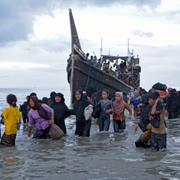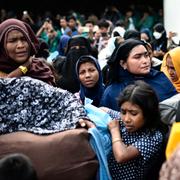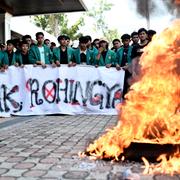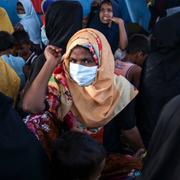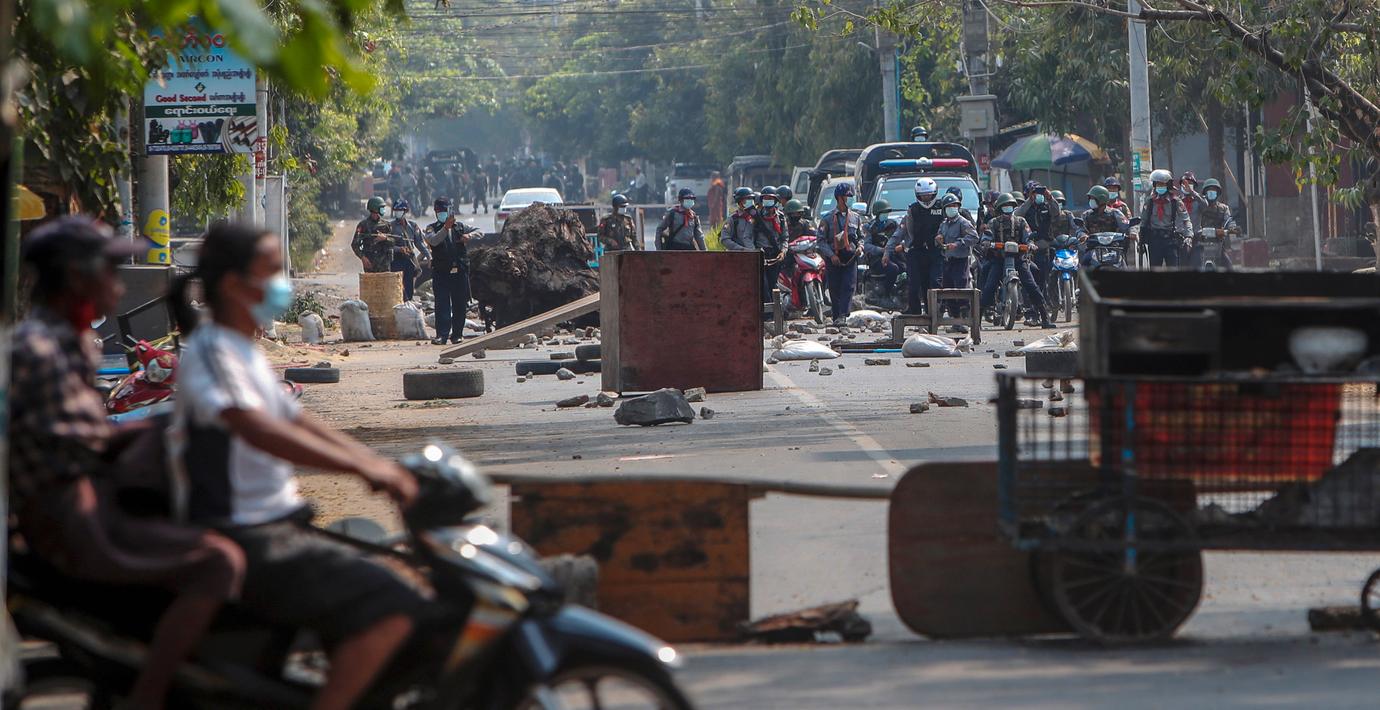
FN:s säkerhetsråd kräver ett slut på våldet i Myanmar
FN:s säkerhetsråd har under onsdagen godkänt sin första resolution om situationen i Myanmar, rapporterar AFP. Säkerhetsrådet kräver att militärjuntan omedelbart får ett slut på våldet och att alla godtyckligt fängslade släpps fria, inklusive tidigare ledaren Aung San Suu Kyi.
Säkerhetsrådet understryker även att förtrycket och våldet som minoritetsgruppen rohingyer utstår i landet måste upphöra omedelbart.
Bland rådets 15 medlemmar röstade 12 ja till att resolutionen skulle antas, Kina, Ryssland och Indien röstade inte.
I början av 2021 störtade en militärjunta den demokratiskt tillsatta regeringen i landet. Sedan dessa har det varit oroligt och strider mellan juntan och rebeller är vanligt förekommande.
bakgrund
Statskuppen i Myanmar
Wikipedia (en)
A coup d'état in Myanmar began on the morning of 1 February 2021, when democratically elected members of the country's ruling party, the National League for Democracy (NLD), were deposed by the Tatmadaw—Myanmar's military—which then vested power in a military junta. Acting president Myint Swe proclaimed a year-long state of emergency and declared power had been transferred to Commander-in-Chief of Defence Services Min Aung Hlaing. It declared the results of the November 2020 general election invalid and stated its intent to hold a new election at the end of the state of emergency. The coup d'état occurred the day before the Parliament of Myanmar was due to swear in the members elected at the 2020 election, thereby preventing this from occurring. President Win Myint and State Counsellor Aung San Suu Kyi were detained, along with ministers, their deputies, and members of Parliament.On 3 February 2021, Win Myint was charged with breaching campaign guidelines and COVID-19 pandemic restrictions under section 25 of the Natural Disaster Management Law. Aung San Suu Kyi was charged with breaching emergency COVID-19 laws and for illegally importing and using radio and communication devices, specifically six ICOM devices from her security team and a walkie-talkie, which are restricted in Myanmar and need clearance from military-related agencies before acquisition. Both were remanded in custody for two weeks. Aung San Suu Kyi received an additional criminal charge for violating the National Disaster Act on 16 February, two additional charges for violating communications laws and an intent to incite public unrest on 1 March and another for violating the official secrets act on 1 April.As of 29 March 2022, at least 1,719 civilians, including children, have been killed by the junta forces and 9,984 arrested. Three prominent NLD members also died while in police custody in March 2021, and four pro-democracy activists were executed by the junta in July 2022.
bakgrund
Rohingyer
Wikipedia (en)
The Rohingya people () are a stateless Indo-Aryan ethnic group who predominantly follow Islam and reside in Rakhine State, Myanmar (previously known as Burma). Before the Rohingya genocide in 2017, when over 740,000 fled to Bangladesh, an estimated 1.4 million Rohingya lived in Myanmar. Described by journalists and news outlets as one of the most persecuted minorities in the world, the Rohingya are denied citizenship under the 1982 Myanmar nationality law. There are also restrictions on their freedom of movement, access to state education and civil service jobs. The legal conditions faced by the Rohingya in Myanmar have been compared to apartheid by some academics, analysts and political figures, including Nobel laureate Bishop Desmond Tutu, a South African anti-apartheid activist. The most recent mass displacement of Rohingya in 2017 led the International Criminal Court investigating crimes against humanity, and led to the International Court of Justice investigating genocide.The Rohingya maintain they are indigenous to western Myanmar with a heritage of over a millennium and influence from the Arabs, Mughals, and Portuguese. The community claims it is descended from people in precolonial Arakan and colonial Arakan; historically, the region was an independent kingdom between Southeast Asia and the Indian subcontinent. The Myanmar government considers the Rohingya as British colonial and postcolonial migrants from neighbouring Chittagong/East Bengal respectively Bangladesh. It argues that a distinct precolonial Muslim population is recognized as Kaman, and that the Rohingya conflate their history with the history of Arakan Muslims in general to advance a separatist agenda. In addition, Myanmar's government does not recognise the term "Rohingya" and prefers to refer to the community as "Bengali". Rohingya campaign groups and human rights organizations demand the right to "self-determination within Myanmar".Various armed insurrections by the Rohingya have taken place since the 1940s and the population as a whole has faced military crackdowns in 1978, 1991–1992, 2012, 2015, and particularly in 2016–2018, when most of the Rohingya population of Myanmar was driven out of the country, into neighbouring Bangladesh. By December 2017, an estimated 625,000 refugees from Rakhine, Myanmar, had crossed the border into Bangladesh since August 2017. UN officials and Human Rights Watch have described Myanmar's persecution of the Rohingya as ethnic cleansing. The UN human rights envoy to Myanmar reported "the long history of discrimination and persecution against the Rohingya community... could amount to crimes against humanity", and there have been warnings of an unfolding genocide. Probes by the UN have found evidence of increasing incitement of hatred and religious intolerance by "ultra-nationalist Buddhists" against Rohingyas while the Myanmar security forces have been conducting "summary executions, enforced disappearances, arbitrary arrests and detentions, torture and ill-treatment, and forced labour" against the community.Before the 2015 Rohingya refugee crisis and the military crackdown in 2016 and 2017, the Rohingya population in Myanmar was close to 1.4 million, chiefly in the northern Rakhine townships, which were 80–98% Rohingya. Since 2015, over 900,000 Rohingya refugees have fled to south-eastern Bangladesh alone, and more to other surrounding countries, and major Muslim nations. More than 100,000 Rohingyas in Myanmar are confined in camps for internally displaced persons. Shortly before a Rohingya rebel attack that killed 12 security forces on 25 August 2017, the Myanmar military launched "clearance operations" against the Rohingya Muslims in Rakhine state that, according to NGOs, the Bangladeshi government and international news media, left many dead, and many more injured, tortured or raped, with villages burned. The government of Myanmar has denied the allegations.
Omni är politiskt obundna och oberoende. Vi strävar efter att ge fler perspektiv på nyheterna. Har du frågor eller synpunkter kring vår rapportering? Kontakta redaktionen
